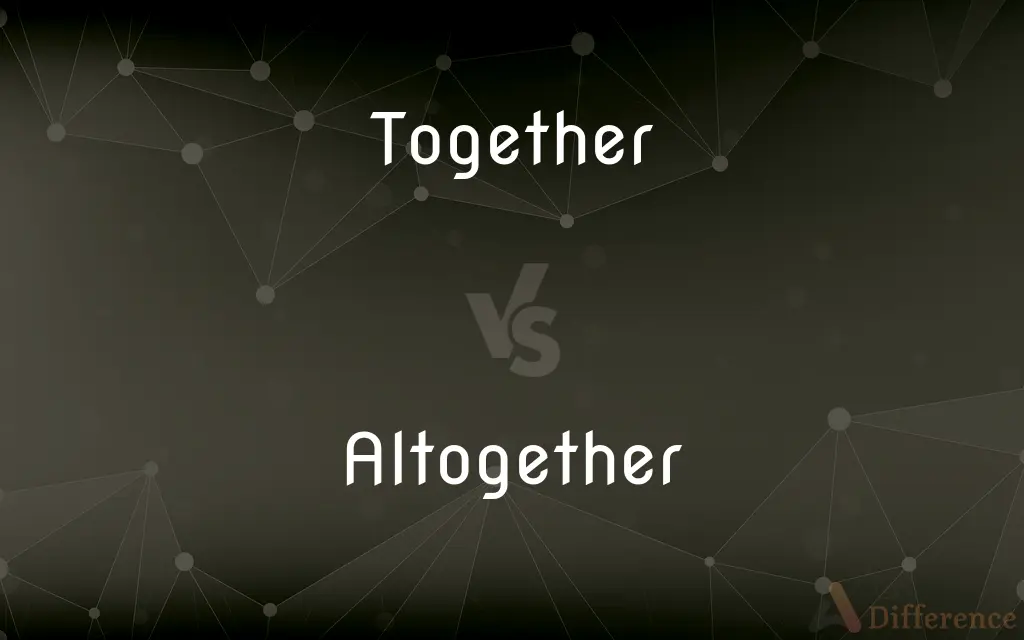Together vs. Altogether — What's the Difference?
By Tayyaba Rehman & Urooj Arif — Updated on April 17, 2024
"Together" indicates being in proximity or participating jointly, while "altogether" means completely or in total.

Difference Between Together and Altogether
Table of Contents
ADVERTISEMENT
Key Differences
"Together" is used when describing the act of unity or being in close association, as in a group activity. Whereas "altogether" refers to an overall sum or entirety, often used to summarize or conclude.
In conversation, "together" might describe people cooperating, such as "working together". On the other hand, "altogether" is employed to emphasize a whole, as in "altogether, the event was a success".
When planning events, one might ask friends to come together at a specific time. Conversely, "altogether" could be used to express the total count of attendees expected.
In terms of spatial arrangement, "together" can imply objects placed closely, like books kept together on a shelf. However, "altogether" suggests a complete or total effect, such as when assessing the visual impact of a decorated room.
Expressing emotions or actions, "together" often appears in contexts implying collaboration or collective effort, e.g., "They sang together." Conversely, "altogether" can be found in expressions of completeness, like "It was altogether a fantastic performance."
ADVERTISEMENT
Comparison Chart
Meaning
In company; with each other
Completely; totally
Usage in Sentences
They worked together on the project.
It was altogether a different experience.
Contextual Use
Physical or cooperative proximity
Summarizing, expressing total effect
Emotional Connotation
Implies collaboration or unity
Indicates totality or finality
Example Phrases
Get together, live together
Altogether different, altogether impossible
Compare with Definitions
Together
At the same time.
They arrived together.
Altogether
Completely.
He was altogether unaware of the facts.
Together
In each other's company.
They lived together for two years.
Altogether
Wholly, entirely.
The proposal was altogether brilliant.
Together
Coordinating with each other.
They worked together to solve the problem.
Altogether
Considering everything.
Altogether, it was a successful meeting.
Together
In unison, simultaneously.
The choir sang together.
Altogether
Including everything.
Altogether, the book contains twelve chapters.
Together
Collectively.
They pooled their money together.
Altogether
In total, summing up.
There were fifty people altogether.
Together
In or into a single group, mass, or place
We gather together.
Altogether
Entirely; completely; utterly
Lost the TV picture altogether.
An altogether new approach.
Together
In or into contact
The cars crashed together. She mixed the chemicals together.
Altogether
With all included or counted; all told
There were altogether 20 people at the dinner.
Together
In association with or in relationship to one another; mutually or reciprocally
Getting along together.
Altogether
On the whole; with everything considered
Altogether, I'm sorry it happened.
Together
By joint or cooperative effort
We ironed the entire load of clothes together.
Altogether
A state of nudity. Often used with the
In the altogether.
Together
Regarded collectively; in total
She is worth more than all of us together. Considered together, the proposals made little sense.
Altogether
Completely, wholly, or without exception.
Together
In or into a unified structure or arrangement
Put the food processor together.
Altogether
On the whole; with everything considered.
Altogether, I'm sorry it happened.
Together
Simultaneously
The bells rang out together.
Altogether
With everything included
Altogether, your bill comes to $6.99.
Together
In harmony or accord
We stand together on this issue.
Altogether
(informal) Intensifier, "without doubt", "clearly"
It was a great game altogether
Together
(Informal) Into an effective, coherent condition
Get yourself together.
Altogether
A state of nakedness. (Especially in the phrase in the altogether)
Together
Emotionally stable and effective in performance
She's really together.
Altogether
All together; conjointly.
Altogether they went at once.
Together
In tune with what is going on; hip.
Altogether
Without exception; wholly; completely.
Every man at his best state is altogether vanity.
Together
At the same time, in the same place; in close association or proximity.
We went to school together.
Altogether
Nakedness; - used mostly in the phrase "in the altogether".
Together
Into one place; into a single thing; combined.
He put all the parts together.
Altogether
Informal terms for nakedness;
In the raw
In the altogether
In his birthday suit
Together
In a relationship or partnership, for example a business relationship or a romantic partnership.
Bob and Andy went into business together.
Jenny and Mark have been together since they went on holiday to Mexico.
Altogether
To a complete degree or to the full or entire extent (`whole' is often used informally for `wholly');
He was wholly convinced
Entirely satisfied with the meal
It was completely different from what we expected
Was completely at fault
A totally new situation
The directions were all wrong
It was not altogether her fault
An altogether new approach
A whole new idea
Together
Without intermission or interruption; continuously; uninterruptedly.
It has been raining four days together
Altogether
With everything included or counted;
Altogether he earns close to a million dollars
Together
(colloquial) Coherent; well organized.
He's really together.
Altogether
With everything considered (and neglecting details);
Altogether, I'm sorry it happened
All in all, it's not so bad
Together
In company or association with respect to place or time; as, to live together in one house; to live together in the same age; they walked together to the town.
Soldiers can never stand idle long together.
Together
In or into union; into junction; as, to sew, knit, or fasten two things together; to mix things together.
The king joined humanity and policy together.
Together
In concert; with mutual coöperation; as, the allies made war upon France together.
Take the bad together with the good.
Together
Mentally and emotionally stable;
She's really together
Together
In conjunction with; combined;
Our salaries put together couldn't pay for the damage
We couldn`t pay for the damages with all out salaries put together
Together
In contact with each other;
The leaves stuck together
Together
Assembled in one place;
We were gathered together
Together
In each other's company;
We went to the movies together
The family that prays together stays together
Together
At the same time;
We graduated together
Together
With cooperation and interchange;
We worked together on the project
Together
With a common plan;
Act in concert
Common Curiosities
What type of word is "together"?
"Together" is an adverb that describes the action of being in close proximity or acting in unison.
Can "together" be used to describe a relationship status?
Yes, "together" is commonly used to describe individuals in a romantic relationship.
Does "altogether" have synonyms that are used in similar contexts?
Yes, synonyms include "entirely," "completely," and "wholly."
Can "together" be used in a business context?
Yes, it's often used to describe collaborative efforts, such as "working together on a project."
What is a common mistake made when using "altogether"?
Confusing it with "all together," which has a different meaning, referring to everyone or everything being in one place.
How does the usage of "together" vary in different English-speaking regions?
The usage of "together" is quite consistent across English-speaking regions, commonly referring to unity or joint action.
How does "altogether" function grammatically in a sentence?
"Altogether" functions as an adverb, modifying verbs, adjectives, or other adverbs, typically conveying the extent of an action or quality.
Is "altogether" used more formally than "together"?
"Altogether" can appear in both formal and informal contexts, much like "together," but its use as a summarizing term may lend it a slightly more formal tone.
What is an example of "altogether" in a literary context?
"The scene was altogether striking and beautiful," illustrating its use to enhance descriptive narrative.
Is "together" ever used in sports terminology?
Yes, "together" is used in sports to describe teamwork, such as a team playing well together.
Does "altogether" have multiple meanings or uses?
Yes, it can mean "completely," "including everything," or "in total," depending on the context.
What kind of phrases often include "altogether"?
Phrases that aim to summarize or conclude discussions, like "altogether, it was a well-attended event."
How can "together" enhance the emotional tone of a sentence?
It adds a sense of unity and collective effort, which can be emotionally uplifting or supportive.
Is there a difference in how "together" and "altogether" are perceived in terms of clarity or ambiguity?
"Together" is generally straightforward, indicating closeness or cooperation, whereas "altogether" might require more context to clarify whether it means "completely," "including everything," or "in total."
Can "together" be used to describe timing, apart from spatial proximity?
Yes, it can also refer to actions happening at the same time, like "arriving together."
Share Your Discovery

Previous Comparison
Shut vs. Shuttered
Next Comparison
Mouth vs. BeakAuthor Spotlight
Written by
Tayyaba RehmanTayyaba Rehman is a distinguished writer, currently serving as a primary contributor to askdifference.com. As a researcher in semantics and etymology, Tayyaba's passion for the complexity of languages and their distinctions has found a perfect home on the platform. Tayyaba delves into the intricacies of language, distinguishing between commonly confused words and phrases, thereby providing clarity for readers worldwide.
Co-written by
Urooj ArifUrooj is a skilled content writer at Ask Difference, known for her exceptional ability to simplify complex topics into engaging and informative content. With a passion for research and a flair for clear, concise writing, she consistently delivers articles that resonate with our diverse audience.















































